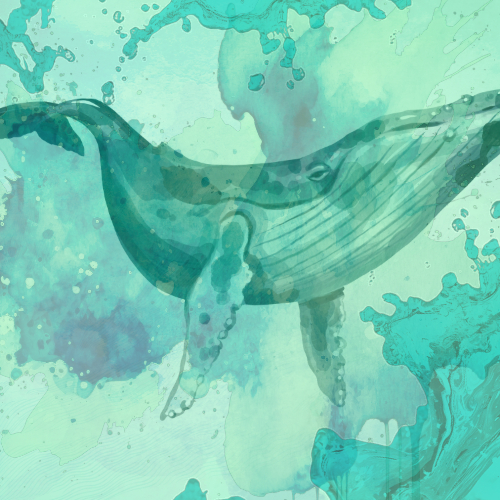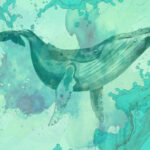The Last Two
Flash Fiction
by V. Kate Hutchings
And so it comes to pass that the whale and I are the last two souls on this good Earth. She looks at me with that eye of hers, round and blue and human. I don’t know what kind of whale she is, and neither does she. Whales don’t speak in species, orders, and classes, she says. I remember the word Minke from some time past; perhaps I saw it in a science book as a girl. So I call her Minke, and she calls me Woman.
I am grateful for her company. The way she shows me the world, through her eye. The Earth is only ocean to her mind, and when I describe a skyscraper she thinks of the tallest mountain she has seen on the seabed. A volcanic plume where the oldest creatures once lived.
I smile and say, “yes, but these buildings touch the very sky.”
She pushes her slick snout from the water and says, “but so do we, no?”
For, to her, a single thin lip is all that parts sea from sky. The meniscus on the top of her world.
I have learned to clamber onto her back. She allows this. She misses the feel of another body against her. Even a single barnacle would be welcome, so she tolerates my arthritic awkwardness; my land legs.
She never takes me deep, never to the mountains of the bed. She knows the depths hurt my ears and that my lungs are only tiny airbags.
So we roll through the shallows, languid and old as time. We speak of the things we know. She tells me she thought she saw a shoal of jellies once, ghosting the deep. Closer, they were only plastic bags. But they gave her comfort anyway, and she stayed with them for seven days.
That was before she saw me on the shore. I had out the sharp rock I keep in my pocket, and I was driving it into a can of tuna which had washed on shore.
My mouth ran with brine that day as she surfaced, breaching the waves with loud spray. I fell back onto the beach of ring pulls and shells and cut my hand.
But I never feared her. As soon as I met her eye, I knew we were the same old woman, roaming the world.
We searched for others, for a while, but we didn’t put in much effort.
“What would I do if I found a man?” I laughed. Minke made her deep-bellied rumble in response, for she had also passed her time. There would never be a calf or child again in the world.
Thus we find joy in just us two. I have learned to love her night song as I sleep on the shore. Her lone voice swells the ocean, a lament for all that has passed.
In the morning, I eat kelp and join her voice with my own reedy song. A choir of two greeting the Sun. For at least She has not yet abandoned us to the colds of space. If there were a third amongst us, it would be She, who mothered all the souls here, before they left.
The ocean is so unpregnant now, like Minke’s vast empty belly, and my swollen, old midsection. But it brings a kind of peace.
“Was not emptiness the first state of things?” Minke asks.
And I nod. Before there was something, I suppose. We are just returning to the before times, the empty uterus of the unborn universe.
And then the day comes, after a night of soundless sleep.
I stretch out my hands and feet, pushing them into the meal of broken fishbones and plastic beads. I wonder at the eerie quiet and blink against the sunrise.
There is a long flank resting like an upturned boat on the shore. It makes no sense to me, this unmoving mound lapped by foam.
I push myself up to stand, walk cautiously, then break into a stiff run, a sob raw in my throat.
“Minke! No, no.”
I heave at her side, attempting to roll her, but my hands slide off her wet rubber skin.
I walk round to her eye, and it stares up, blue and round as an unseeing marble. Some part of me breaks as a wave.
I push my fingers into the fleshy armpit beneath her fin to feel for a beat. I wait, knowing her heart pauses more than pulses. But nothing comes.
My true friend, my dearest one.
I cup the lapping tide and wash her skin of sand and silt. I take two fingers and close her eye. The lid feels like the wet foot of a mollusc, and it seems intimate to touch it.
Then I turn and push my face down into the water and heave tears, tasting my own sorrow and the ocean in brackish gulps.
I have to go away for a time. Her body is impossible to move, and it begins to stink on the beach. Occasionally I return to view her from a distance, as the blubber slowly falls off and strange white tissue and gristle is revealed.
Eventually, she is a cathedral of bones. I climb inside her ribcage and I sing my thin song. The lone voice of the world rocking amongst the ruins of a friend.
I know her passing is insignificant to this good earth. The unmoving stars above are unmoved. Not because they are cold or callous; they simply do not even perceive one such as Minke. We are as a palmful of dust. A palmful of plastic beads.
I turn my face to the Sun, my last companion, who warms me but does not know me, and I wait for my time.
The time when all the world will quiet, and the Earth will turn with its own silent music, with no one to hear it, and no one to know the goodness of this place.

About the Author
V. Kate Hutchings earned her MA in Twentieth-Century Literature in Durham, UK. Her poetry has been recognised by the Tower Poetry Prize. She has been known to feed her writing by backpacking in thirty-five countries, teaching yoga in NYC, and raising her toddlers in Singapore. These days she is working full time on a novel and short fiction. Connect with her @vkatehutchings.


